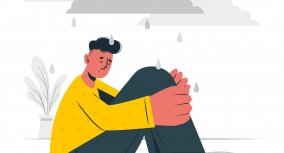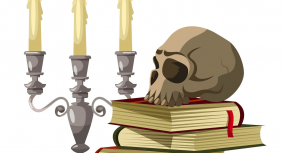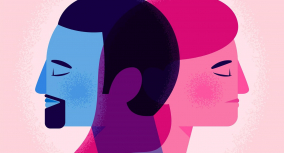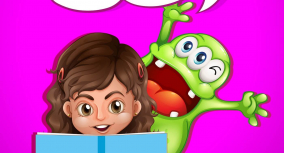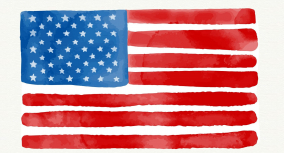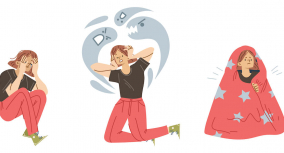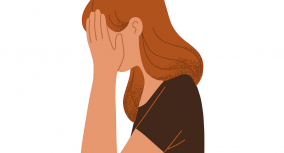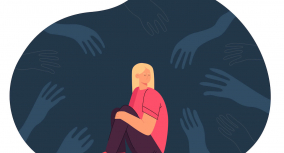Literature reflects human nature and has long been a means for exploring its complexities, particularly when it comes to the themes about love. Joys, challenges, and the transformative power of love are universal topics in world classics and contemporary works. In their article in Philosophy and Literature, Jonathan Gottschall and Marcus Nordlund analyzed many folk tales from different cultures. They concluded that love themes in literature have long been its consistent central element, regardless of societal customs.
If you want to find out more about love and marriage in literature, you came to the right place.
In this article by Custom-Writing.org, you will find:
- A definition of the theme of love
- Different depictions of relationship themes in iconic literary works
- The themes about marriage in literature illustrated by many examples, with a special focus on Pride and Prejudice, Wuthering Heights, and The Great Gatsby
💕 Theme of Love in Literature: Definition & History
Love as a literary theme deals with relationships between people based on affection or desire. It’s a fundamental component of many literary works and one of the most prominent themes in art.
It’s not surprising that people find it universally relatable and infinitely compelling. We come across the theme of love in many genres, but it is mainly associated with medieval and classic romance literature.
Medieval Romance Literature Characteristics
Medieval romance literature, as we understand it, dates back to 12th-century France. Chivalry was the centerpiece of most romances, and it was, of course, accompanied by love.
Courtly Love Definition
Courtly love is the central concept of medieval romance. Why was it so important? Well, the essence of chivalry did not boil down to being brave and masterful in battle. More critical was the knight’s dedication and reverence to his lady, as well as unswerving allegiance to his friends and the king. This devotion of a knight to a lady is called courtly love.
Interestingly, it didn’t matter whether the parties were married or not. According to Medieval Life and Times, one of the rules of courtly love stated that “Marriage is no real excuse for not loving.”
Tragedy was also present in chivalric romances. A great example is Thomas Malory’s Le Morte d’Arthur. Lancelot and Queen Guinevere’s doomed affair couldn’t end in any other way but grievous.
Classic Romance Novels
As you may have guessed, romance novels focus on romantic relationships. For centuries, people have been finding escape in the fictional world of love with its hardships, obstacles, and high emotional stakes, usually resulting in weddings.
There are a few subgenres of a classic romance novel. The most prominent ones are those listed below.
Regency Romance
The 19th century was the most fruitful period for this type of novel. It is represented by authors like Jane Austen and Georgette Heyer.
Gothic Novels
This subgenre is characterized by drama, gloom, a hint of the supernatural, and a remote, secluded setting. All of these characteristics can be found in the Brontë sisters’ most notable works Jane Eyre and Wuthering Heights.
Fantasy Novels
This type can be reminiscent of chivalric romances. It mixes magical elements with noble characters and intertwines fantasy with romance.
💑 Types of Love Themes in Literature
Have you ever wondered why there’s no one concise explanation of what love is? One of the main reasons is that there certainly isn’t just one type of love. Instead, there are many, and in some languages, there are even separate words for them.
What exactly are these types? Well, examples may include romantic, platonic, unrequited, forbidden, and familial love. Since there are so many variations, there must be just as many corresponding plots, each with distinctive features. Let’s talk about them.
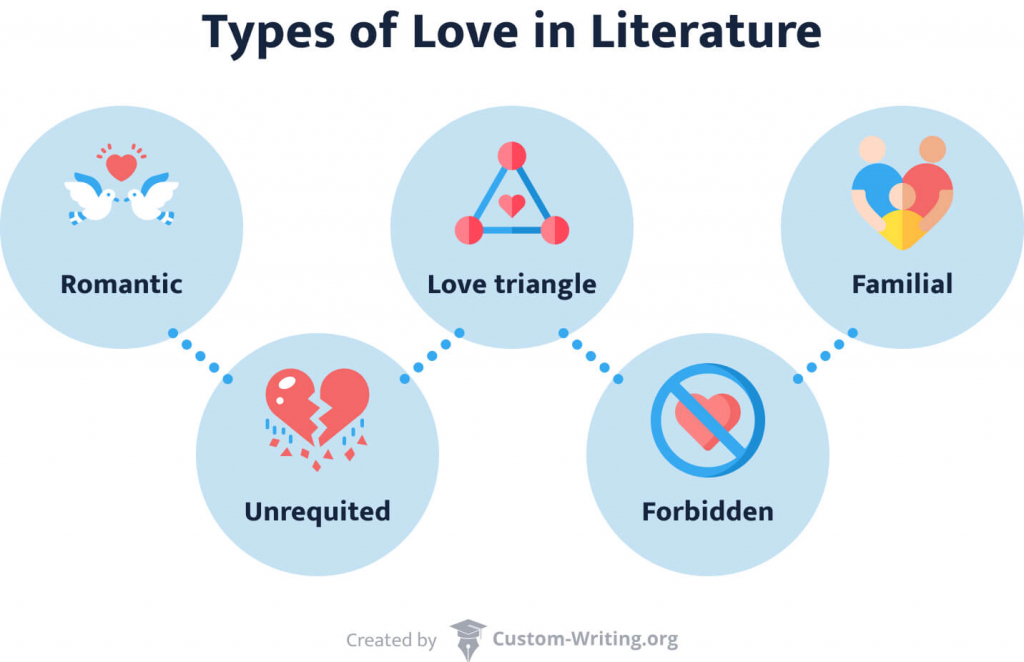
Definition of Romantic Love in Literature
Romantic love in literature is a feeling of intense affection and desire of one character for another. It usually implies intimate relationships between those involved and is distinguished by intensity, idealization, and passion.
Romantic love has a ubiquitous presence across all arts and not just literature. It has been pivotal in shaping our culture and understanding interpersonal relationships. Since it’s been around for so long, it’s hard to tell whether it evolved naturally and found its way into art or was born as a literary construct that found its way into our lives.
Platonic Love vs. Romantic Love Themes
Platonic love is synonymous with friendship and is never physically intimate. In contrast, romantic love involves friendship as well as intimacy, usually culminating in sexual contact. Both types play an important role in people’s lives and can be great literary material.
Unrequited Love Stories
Unrequited love is the romantic feeling that is not reciprocated. The dreaded state of not being loved back has been the source of inspiration for numerous literary works.
There is no unanimous consensus on whether unrequited love is good or bad for a person. Compare these two instances:
- If we look back at the chivalric romance novels, we will see that unrequited love was the source of motivation and a call to action. It required a knight to perform all kinds of heroic deeds to prove his love to a lady. In this, they found the meaning of life.
- In contrast, works such as Goethe’s The Sorrows of Young Werther depict a situation far removed from the 12th century’s image of knightly devotion. Young Werther’s unrequited love is the epitome of sorrow, leading to his untimely end.
Love Triangle Stories
In love triangle stories, there are at least three main characters—a hero and two suitors. The hero has to choose between the two lovers, resulting in either one or three broken hearts. Whatever the outcome is, it’s never a win-win situation.
Famous Love Triangles in Literature
- Pride and Prejudice by Jane Austen. Written in 1813, it tells about the slowly developing affair between Elizabeth Bennet and Mr.Darcy, with Wickham serving as the third party in the triangle.
- Wuthering Heights by Emily Brontë. Heavily influenced by Gothic fiction, this sad, cheerless book talks about a troubled relationship between Heathcliff, Catherine, and her husband Edgar, which is bound to end in disaster.
- The Great Gatsby by F. Scott Fitzgerald. This one is the story of a man who refuses to give up on the desire to reconnect with the married woman he once called his own.
Forbidden Love Stories
Forbidden love in literature is characterized by an almost immediate attraction between characters. But, like in Shakespeare’s Romeo and Juliet, the idyllic picture is blurred by an obligatory obstacle on the way to perfect love, such as:
- Class
- Prejudice
- Religious restrictions
- Distance
- “Us vs. Them” mentality
Familial Love in Literature
A familial kind of love is cultivated within a family unit. It is rooted in trust, commitment, affection, and loyalty, regardless whether you are connected to your family members by blood or not. This kind of love is distinctively different from others. It doesn’t include the same level of intimacy as in romance, but it doesn’t take away from the deep connection, friendship, and trust.
Familial love is fertile soil for writers. The 19th-century heart-warming classic Little Women by Louisa May Alcott may be one of the most splendid examples of family love portrayal in literature. Another example is the 21st-century post-apocalyptic novel The Road by Cormac McCarthy.
💎 Stories of Marriage in Literature
Much like in real life, marriage in literature has many faces. Some stories portray happily married people exuding joy, while others are depictions of deep sorrow. Marriage can be a source of bliss, but at times it gets corrupted by oppression and patriarchy. As Leo Tolstoy told us in Anna Karenina, “All happy families are alike; each unhappy family is unhappy in its own way.”
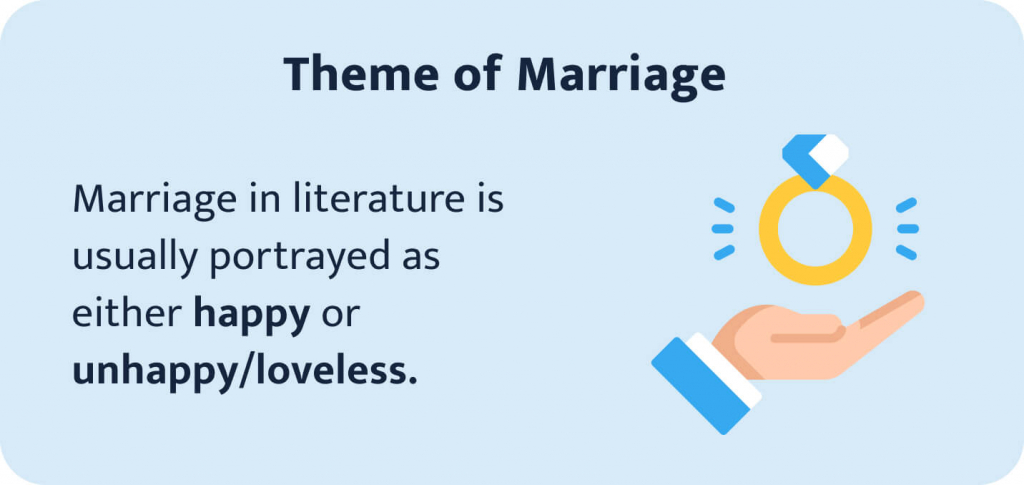
- A happy story will most likely end in an equally happy marriage. The main characters will inevitably possess key features that make them perfect for each other.
- Tragic stories usually look at experienced couples battling marital problems. It’s often connected with the issue of appearance vs. reality. We all have an idea of a happy family, and people try to stick to it no matter what. However, only they can see what goes on behind closed doors. It may be an issue of jealousy, untrusting or untrustworthy spouses, disrespectful attitudes, and downright boredom.
Happy Marriage Stories
So, what are those key factors of a happy marriage that we have mentioned? There are a few popular ones that you are likely to encounter in literature, as well as in reality:
- Mutual respect. By default, love should come with mutual appreciation. Otherwise, it is no love at all.
- Support. A loving husband or wife will stand behind their spouse’s decision. It’s a logical outcome of respect.
- Partnership. Decisions are made together, and responsibility is divided between the two.
- Room to evolve. Nothing holds you back from becoming the best version of yourself.
Loveless Marriage Stories
Loveless marriage stories are abundant in world literature. Some can be a result of people misinterpreting their feelings for one another. Others come as an tragic result of an arrangement. Since arranged marriages are made with money and status in mind rather than love and respect, it is no wonder they fall apart.
Married but in Love with Someone Else
One of the types of an unhappy marriage is when the protagonist is married and in love. But—plot twist—they have feelings for someone other than their spouse. It is closely connected with the love triangle theme and often results in adultery and a tragic ending, like in Anna Karenina or Gustave Flaubert’s Madame Bovary. This type of story can also tell about two characters in love with one another but married to someone else.
📚 Marriage and Love Themes in Literature: Examples & Quotes
Seeing that love and marriage are so prevalent in fiction, there is no shortage of examples and quotes we can share with you.
Love in Pride and Prejudice
No conversation about love is complete without mentioning Pride and Prejudice by the English novelist Jane Austen. Love comes in many forms in this masterpiece.
Let’s have a look at a few of them.
A Love Triangle
When you think of a love triangle story, Pride and Prejudice is probably not the first one that comes to mind. Nevertheless, there are a few of them in the book. The main one is the Darcy-Elizabeth-Wickham triangle. Elizabeth is attracted to both men at various points in time, and both are attracted to her.
Romantic Love
Indeed, there are plenty of characters who are romantically involved. Darcy-Elizabeth and Lydia-Wickham are the most prominent couples.
Familial Love
A lot can be said about the relationships and the family love in the Bennet family. And while not all of them are good, there are some positive examples. The main one is the sisterly love between the Bennet girls, especially between Elizabeth and Jane, who share the closest bond.
Theme of Marriage in Pride and Prejudice
Much like the theme of love, the marriage theme is equally nonuniform in Pride and Prejudice. We see both positive and negative examples of relationships built on very different things:
- Lydia and Wickham. “A disaster waiting to happen” would be a good description of Lydia’s elopement with Wickham. He doesn’t love her, and she is not sure of her feelings but hopes for marriage. While Darcy and Elizabeth eventually develop a true love for each other, the relationships between Lydia and Wickham are built on the prospects of Wickham getting away from debt.
- The Gardiner family. A great contrast to Mr. and Mrs. Bennet, the Gardiners are well-intended, intelligent, and reasonable people who play a key role in Elizabeth and Darcy’s blooming relationship. Mr. Gardiner, being Mrs. Bennet’s brother, is portrayed as someone drastically different from his sister. The relationships between the Gardiners are also more mature and respectful than those of the Bennet couple.
Eager to learn more about the novel and its themes? Check out our analysis of Pride and Prejudice.
Pride and Prejudice: Love Quotes
No one is better at portraying the relationships in a novel than its author. Here are a few most famous quotes about love, which show the true feelings of the well-known characters, from Jane Austen herself:
She began now to comprehend that he was exactly the man who, in disposition and talents, would most suit her. His understanding and temper, though unlike her own, would have answered all her wishes. It was a union that must have been to the advantage of both: by her ease and liveliness, his mind might have been softened, his manners improved; and from his judgement, information, and knowledge of the world, she must have received benefit of greater importance.
Pride and Prejudice, Narrator, Chapter 50
In vain, have I struggled. It will not do. My feelings will not be repressed. You must allow me to tell you how ardently I admire and love you.
Pride and Prejudice, Mr. Darcy, Chapter 34
Oh, Lizzy! do anything rather than marry without affection.
Pride and Prejudice, Jane Bennet, Chapter 59
Love in Wuthering Heights
This timeless classic by Emily Bronte is also not on the list of novels with a happy ending. Nevertheless, it’s a gift that keeps on giving: love is abundant here, but it’s also very different. Let’s have a look at the shapes it takes in Wuthering Heights:
- The love between Catherine and Heathcliff— the two main characters—is not the typical romantic attachment we’re used to seeing in films and novels. It is passionate but obsessive, destructive, and filled to the brim with jealousy. There is no happy ending when two people can neither be together nor apart. The situation is further convoluted by the societal prejudice of the time, Heathcliff’s troublesome and vengeful nature, and Catherine’s desire to rise through the ranks of society.
- There’s also love between Catherine and Edgar—the man she eventually marries and has a daughter with. Edgar, being very different from Heathcliff, treats Catherine with affection and tenderness. He is not tormented by social class inequality and lack of money. While he’s weaker and softer in personality than Heathcliff, he can give Catherine the status that she desires. Unfortunately, none of this can bring Catherine true love.
Who Is Catherine’s One True Love in Wuthering Heights?
Catherine’s one true love is Heathcliff. She believes they are alike and considers him her only true friend. She says “yes” to Edgar’s proposal to secure her position in society and help Heathcliff but realizes she’s made a mistake when it’s too late.
Theme of Marriage in Wuthering Heights
Catherine’s love triangle between hetself, Heathcliff, and Edgar makes her face a painful choice: to surrender to her love for forever agonizing Heathcliff, a man of lowly background, or to marry an affectionate man of much higher class.
At one point, Catherine declares: “I am Heathcliff!” meaning that their identities are so alike that they’re essentially one person; they share a soul. But in the same conversation, she admits that marrying Heathcliff would “degrade” her.
On the contrary, marrying Edgar Linton can lift her up. She hopes that his money will help not only her but also her soulmate, Heathcliff. In her eagerness to preserve both relationships and get the best of both worlds, Catherine chooses to marry Edgar. This selfish act drives Heathcliff away and later proves to be a tragic mistake.
Is Wuthering Heights a Love Story?
Wuthering Heights has a lot in common with a love story, but it is also more than that. The theme of love is inseparable from that of destruction and revenge. Heathcliff seeks vengeance for his broken heart, and his disturbing love eventually becomes a dark obsession.
Feel free to read our Wuthering Heights summary to learn more about the novel’s plot.
Wuthering Heights: Love Quotes
To better understand the tragic torment of the main characters in this outstanding gothic novel, let’s take a look at a few quotes:
He shall never know I love him: and that, not because he’s handsome, but because he’s more myself than I am. Whatever our souls are made out of, his and mine are the same.
Wuthering Heights, Catherine Earnshaw, Chapter IX
Catherine Earnshaw, may you not rest as long as I am living. You said I killed you–haunt me then. The murdered do haunt their murderers. I believe–I know that ghosts have wandered the earth. Be with me always–take any form–drive me mad. Only do not leave me in this abyss, where I cannot find you! Oh, God! It is unutterable! I cannot live without my life! I cannot live without my soul!
Wuthering Heights, Heathcliff, Chapter XVI
If he loved with all the powers of his puny being, he couldn’t love as much in eighty years as I could in a day.
Wuthering Heights, Heathcliff, Chapter XIV
Theme of Love in The Great Gatsby
The Great Gatsby is a story of pain, longing, and obsession. The love triangle here is somewhat reminiscent of the one in Wuthering Heights. Jay Gatsby and Daisy are in love, Jay goes to war, and Daisy marries Tom Buchanan, breaking Gatsby’s heart upon his return five years later.
What might appear as a choice between two lovers really is a choice between love and prestige:
- Jay Gatsby, being the nouveau riche, can only offer Daisy his imperfect version of love.
- Tom Buchanan can offer safety, status, and endless money for her wishes.
Daisy shows her true colors when she chooses Tom and, by association, wealth and security.
Unfortunately, Gatsby cannot give up on the idea of having Daisy all to himself. He finds it difficult to accept that the last piece of the perfect puzzle that constitutes his dream is missing. This unreadiness to come to terms with defeat is what ultimately destroys the Great Gatsby.
Did Gatsby Really Love Daisy?
Gatsby thought that he loved Daisy, but he only loved what she represented to him—a perfect life, the American dream, and wealth. He once said: “Her voice is full of money,” which clearly indicates his true feelings.
Marriage in The Great Gatsby
As we’ve already mentioned, Daisy marries Tom not because she’s in love with him. Their marriage is loveless. Her glittering persona hides superficiality, and she doesn’t suffer much when making her choice. Let’s see why.
The main issue here is that of old vs. new money. Jay represents new money obtained through shady ways. Tom is old money, which is undeniably more powerful, alluring, and prestigious. And that’s the main reason why Daisy chooses in Tom’s favor.
You will find even more info in our article on The Great Gatsby characters. Check it out!
The Great Gatsby: Love Quotes
He hadn’t once ceased looking at Daisy, and I think he revalued everything in his house according to the measure of response it drew from her well-loved eyes. Sometimes, too, he stared around at his possessions in a dazed way, as though in her actual and astounding presence none of it was any longer real. Once he nearly toppled down a flight of stairs.
The Great Gatsby, Nick Carraway, Chapter 5
Here’s how F.S. Fitzgerald conveyed the theme of love and obsession in The Great Gatsby:
He wanted nothing less of Daisy than that she should go to Tom and say: ‘I never loved you.’ After she had obliterated four years with that sentence they could decide upon the more practical measures to be taken. One of them was that, after she was free, they were to go back to Louisville and be married from her house – just as if it were five years ago.
The Great Gatsby, Nick Carraway, Chapter 6
His heart beat faster and faster as Daisy’s white face came up to his own. He knew that when he kissed this girl, and forever wed his unutterable visions to her perishable breath, his mind would never romp again like the mind of God. So he waited, listening for a moment longer to the tuning-fork that had been struck upon a star. Then he kissed her. At his lips’ touch she blossomed for him like a flower and the incarnation was complete.
The Great Gatsby, Nick Carraway, Chapter 6
As you can see, much has been written about love—both happy and tragic. We hope that our article inspired your interest in further exploration of the topic. Tell us about your favorite literary work about love in the comment section below!
🔍 References
- The Abject Lover of the Courtly Love Era: Research Gate
- Romance: Literature and Performance: Britannica
- Writing 101: What Is a Romance Novel?: Masterclass
- Romantic Love: A Literary Universal?: Project MUSE
- Love in Literature: The Guardian
- Reading Remedy: Books to Help You Deal with Unrequited Love
- Family Love: What It Is, What It Looks Like, And How To Make It Happen: Better Help
- Why Family Is The One Thing Authors Will Always Write About: Huffpost
- Why the Marriage Plot Need Never Get Old: The New Yorker
- 10 Novels That Teach You Something About Marriage: Barnes and Noble
- 11 of the Worst Marriages in Literature: Electric Literature
- Daisy Buchanan: Love, Folly and Money in The Great Gatsby: The Artifice
